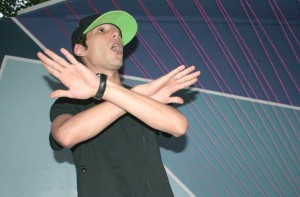*
Moroccan rap is growing in Somerville.
In front of curtains bearing red, orange, and brown stripes, and between detailed Moroccan lanterns, a young Moroccan rapper took the stage July 27 in Union Square. The audience watched from rows of chairs as rapper Would Capital performed four songs, switching between French, English, Spanish, and Arabic as he sang.
The show was a local display of a modern North African art. It was also an opportunity for fans of Moroccan music, including six Moroccan artists who now live in Somerville, to come together. A Fez City Clan music video was premiered, and Would Capital performed live.
The music video shows the Fez City Clan walking down the streets of Fez, Morocco as graffiti sprouts across the walls of buildings and archways. The rappers were singing about fame, and the chorus translates to “Nobody can bottle me.” The video was shot, produced, and edited by Len White of Somerville, who also created the special effects.
“[Fez City Clan] loves to have weird New York stuff behind them at all times,” White said. He pointed out a John Travolta poster seen behind the group in one scene of the video.
White met the band when he travelled to Morocco in 1998. He recalled that the group was starstruck when he mentioned he had contributed to the special effects of the Spider Man movies, and hired him on the spot. “They never gave me any artistic edits,” White said. “They wanted more graffiti.” Returning home he met the Somerville artist known as Would Capital, and together they had the idea for last week’s show.
Capital started rapping at 13 years old, and began his career at age 17. He says, “Moroccan rap started in 1992. It is the source of Arabic rap. Originally people didn’t believe it is like rap. They say rap is American music. After 2005, they found young artists tried to pass messages with rap. Always, we rap about government, problems, poverty… [American artists] rap about money and clothes. Mohammed VI changed many things. In 2005 people started believing there is the art of the street.”
“I don’t like the name rappers,” Capital said. “Rappers is a name that comes from the ghetto. I call them artists.”
Would Capital performed four of his songs, giving a passionate and talented performance despite technical difficulties.
The first song played was Would Capital’s first song written in America. After that, Would Capital performed “Ana L-Boss,” which translates to “I’m the boss”
Would Capital talked briefly about the content of this song. “Everybody dreams of being a millionaire.” He said. “Good life, good wife, and he is the boss. I’m the boss of Moroccan rap. I call myself the boss in music.”
Capital also performed “Go Hard,” a collaboration with L-Tzack West. “I heard three words when I first came to America,” Would Capital said. “I heard money, go hard, do your best. This song is not about money, it’s about how everybody goes hard.”
Finally, Would Capital performed a remix of Uptown, which he has not released yet.
“I am not here only for me,” Capital said. “I represent my country, which is Morocco. I am not here only for me.”
At last week’s show, some audience members were Moroccan musicians, some had heard Moroccan music before and enjoyed it, and some were interested in Moroccan culture.
“A few years back there was no such thing as Moroccan rap,” said Nordine Benhaga of Somerville, a fan of Moroccan music who comes from Somerville’s sister city in Morocco, Tiznit. “At the beginning it was hard to accept this kind of thing in Morocco but… rap is flourishing right now.”













Reader Comments